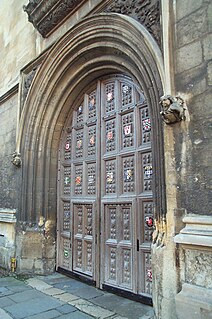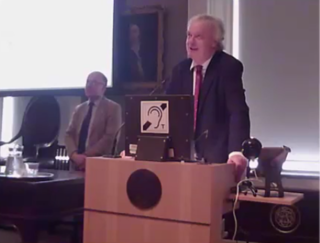Related Research Articles

The University of Oxford is a collegiate research university in Oxford, England. There is evidence of teaching as early as 1096, making it the oldest university in the English-speaking world and the world's second-oldest university in continuous operation. It grew rapidly from 1167 when Henry II banned English students from attending the University of Paris. After disputes between students and Oxford townsfolk in 1209, some academics fled north-east to Cambridge where they established what became the University of Cambridge. The two English ancient universities share many common features and are jointly referred to as Oxbridge. Oxford is ranked among the most prestigious universities in the world.

The Bodleian Library is the main research library of the University of Oxford, and is one of the oldest libraries in Europe. It derives its name from its founder, Sir Thomas Bodley. With over 13 million printed items, it is the second-largest library in Britain after the British Library. Under the Legal Deposit Libraries Act 2003, it is one of six legal deposit libraries for works published in the United Kingdom, and under Irish law it is entitled to request a copy of each book published in the Republic of Ireland. Known to Oxford scholars as "Bodley" or "the Bod", it operates principally as a reference library and, in general, documents may not be removed from the reading rooms.

All Souls College is a constituent college of the University of Oxford in England. Unique to All Souls, all of its members automatically become fellows. It has no undergraduate members, but each year recent graduate and postgraduate students at Oxford are eligible to apply for a small number of examination fellowships through a competitive examination and, for those shortlisted after the examinations, an interview.

Linacre College is a constituent college of the University of Oxford in the UK whose members comprise approximately 50 fellows and 550 postgraduate students.

Kellogg College is a graduate-only constituent college of the University of Oxford in England. Founded in 1990 as Rewley House, Kellogg is the university's 36th college and the largest by number of students. It hosts research centres including the Institute of Population Ageing and the Centre for Creative Writing, and is closely identified with lifelong learning at Oxford.

Richard Ovenden is a British librarian and author. He currently serves as Bodley's Librarian in the University of Oxford, having been appointed in 2014. Ovenden also serves as the Director of the Bodleian Library's Centre for the Study of the Book and holds a Professorial Fellowship at Balliol College. Ovenden is a trustee of the Chawton House Library and vice-chair of the Kraszna-Krausz Foundation. In 2009, he was elected chair of the Digital Preservation Coalition, replacing Dame Lynne Brindley in a post he held until 2013. He was elected to the American Philosophical Society in 2015. He is a Fellow of the Society of Antiquaries of London, having been elected in 2008.
Sarah Elizabeth Thomas is an American librarian best known for her leadership positions in a number of research libraries. In May 2013 it was announced that she had been appointed vice president for Harvard University Library; she took up the post in August 2013.

Falconer Madan was Librarian of the Bodleian Library of Oxford University.

The head of the Bodleian Library, the main library at the University of Oxford, is known as Bodley's Librarian: Sir Thomas Bodley, as founder, gave his name to both the institution and the position. Although there had been a university library at Oxford since about 1320, it had declined by the end of the 16th century. It was "denuded" of its books in 1550 in the time of King Edward VI when "superstitious books and images" that did not comply with the prevailing Anglican view were removed. Poor management and inadequate financial resources have also been blamed for the state of the library. In the words of one history of the university, "as a public institution, the Library had ceased to function." Bodley volunteered in 1598 to restore it; the university accepted the offer, and work began soon afterwards. The first librarian, Thomas James, was selected by Bodley in 1599. The Bodleian opened in 1602, and the university confirmed James in his post. Bodley wanted the librarian to be "some one that is noted and known for a diligent student, and in all his conversation to be trusty, active, and discrete, a graduate also and a linguist, not encumbered with marriage, nor with a benefice of Cure". James, however, was able to persuade Bodley to let him marry and become Rector of St Aldate's Church, Oxford.
Sir Herbert Henry Edmund Craster was a British librarian, who served as Bodley's Librarian from 1931 to 1945.
John William Jolliffe was a British librarian and academic who was Bodley's Librarian from 1982 until his death.
David George Vaisey CBE is a British librarian who was Bodley's Librarian from 1986 until 1996.
Reginald Philip Carr is an English librarian, who was Bodley's Librarian from 1997 until his retirement in 2006. He is a member of the Christadelphian church.

The position of Keeper of the Archives at the University of Oxford in England dates from 1634, when it was established by new statutes for the university brought in by William Laud. The first holder of the post was Brian Twyne, who prepared an index of the archives in 1631 as part of the preparatory work for the statutes: he was appointed Keeper of the Archives as a reward for his work. The archives were moved from the University Church of St Mary the Virgin into the Tower of the Five Orders in the Bodleian Library under Twyne and his successor, and some of the storage cupboards built at that time are still in use. The archives include charters, title deeds, university registers and records, and other official documentation from the university. Most of the material dates from the 19th and 20th centuries, with few photographs and no sound or video recordings.
Francis Wise was an academic, archivist, librarian and antiquarian at the University of Oxford.
Noël Denholm-Young was an English historian. He was a Fellow and archivist of Magdalen College, Oxford specialising in the political history of late medieval England. He worked as keeper of Western manuscripts at the Bodleian Library in Oxford, and later in the faculty of the University College of North Wales, Bangor. Among his publications was an edition of the chronicle Vita Edwardi Secundi.
Alice Prochaska is a former archivist and librarian, who served as Pro-vice-chancellor of the University of Oxford and Principal of Somerville College, Oxford, from 2010 to 2017.

Christopher Francis Rivers de Hamel is a British academic librarian and expert on mediaeval manuscripts. He is a Fellow of Corpus Christi College, Cambridge, and former Fellow Librarian of the Parker Library. His book Meetings with Remarkable Manuscripts is the winner of the Duff Cooper Prize for 2016 and the Wolfson History Prize for 2017.
Faye McLeod is the first female Keeper of the Archives at the University of Oxford in the United Kingdom.
Schuyler Jones CBE is an American anthropologist and museum curator. He is best known for his ethnographic fieldwork in the Nuristan region of Afghanistan, as well as his role as Director of the Pitt Rivers Museum, University of Oxford, between 1985 and 1997. Jones is an Emeritus Fellow of Linacre College, Oxford.
References
- ↑ "Committee for the Archives". Oxford University Gazette. University of Oxford. 21 September 2000. Archived from the original on 9 June 2011. Retrieved 24 August 2010.
- ↑ "Fellows". Linacre College, Oxford. Archived from the original on 31 May 2010. Retrieved 25 August 2010.
- ↑ "University Officers". University of Oxford Calendar 2009–2010. Oxford University Press. 2009. p. 2. ISBN 978-0-19-956692-1.
- ↑ "Oxford University Archives become part of the Bodleian Libraries". Bodleian Library, University of Oxford. 3 August 2010. Retrieved 18 July 2011.